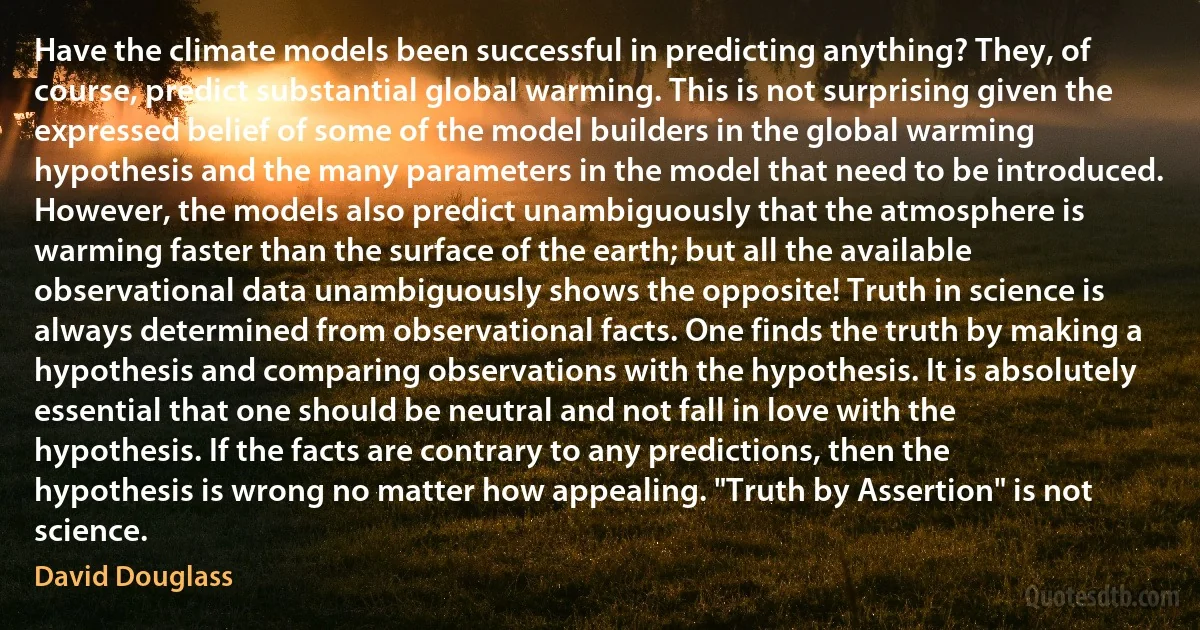
Have the climate models been successful in predicting anything? They, of course, predict substantial global warming. This is not surprising given the expressed belief of some of the model builders in the global warming hypothesis and the many parameters in the model that need to be introduced. However, the models also predict unambiguously that the atmosphere is warming faster than the surface of the earth; but all the available observational data unambiguously shows the opposite! Truth in science is always determined from observational facts. One finds the truth by making a hypothesis and comparing observations with the hypothesis. It is absolutely essential that one should be neutral and not fall in love with the hypothesis. If the facts are contrary to any predictions, then the hypothesis is wrong no matter how appealing. "Truth by Assertion" is not science.
David DouglassRelated topics
anything atmosphere climate course datum earth fall faster given hypothesis love making matter model need predicting predict science should substantial surface surprising truth warming wrong global factsRelated quotes
I think the basic misconception is to speak of the so-called "best” allocation of resources. What is the best? In common economics it is defined as what would be if we knew everything. Economists operate with the fictitious assumption that all the relevant data is known, but this is totally unrealistic. Nobody knows all the data. What we have is widely dispersed knowledge, which cannot be concentrated in one mind. To call the situation-which would use all the knowledge available-"optimal” is nonsense because it is by definition a non-achievable solution. Our problem is not the full utilization of all knowledge but the best use we can achieve with any known institutional structure. In that sense, some oligopolistic (and even monopolistic situations), represent the best possible utilization of knowledge that we can achieve. Even the action of a monopolist can be extremely beneficial.

Friedrich Hayek
It should be clear by now that there are people who can, in fact, be reasonably considered experts; that it is rational to rely, within limits, on ex pert opinion; and that it is possible, by exercising relatively simple criteria, to gain insight into whether a particular expert is reliable or not. It is also true that experts, of course, do make mistakes, and that even the agreement of a large majority of experts in a field does not guarantee that they got it right. That's the nature of scientific truth, as we have seen throughout this book: it is tentative, because it is the result of a human endeavor that is limited both by the type and amount of available evidence and by humans' finite mental powers and emotional reactions. But the examples above show how you can, with a little bit of practice, tell science from bunk!

Massimo Pigliucci
I gave up on this stuff. I gave up on my species and ... I gave up on my countrymen. Because I think we squandered great gifts. I think humans were given great great gifts: walking upright, binocular vision, opposable thumb, large brain ... We grew. We had great gifts, and we gave it all up for both money and God ... We gave it all up to superstition, primitive superstition, primitive shit ... Invisible man in the sky, looking down, keeping track of what we do, make sure we don't do the wrong thing, if we do, he puts us in hell, where we burn forever. That kind of shit is very limiting for this brain we have. So we keep ourselves limited. And then we want a toy and a gizmo and gold and we want shiny things, and we want something to plug in that will make big big big things for us... And all that shit is nothing! It's nothing.

George Carlin
If Christ were to walk in this world today, do you know what would happen to Him? He would be placed in a mental institution and given psycho-therapy, just as would His Saints. The world would crucify Him today just as it did 2000 years ago, for the world has not learned a thing, except more devious forms of hypocrisy. And what would happen if, in one of my classes at the university, I would one day tell my students that all the learning of this world is of no importance beside the duty of worshipping God, accepting the God-man who died for our sins, and preparing for the life of the world to come? They would probably laugh at me, and the university officials, if they found out, would fire me-for it is against the law to preach the Truth in our universities. We say that we live in a Christian society, but we do not: we live in a society.

Seraphim Rose
Macro rational expectations, as I have labeled the hypothesis, seems to say that expectations in an economist's model must be perfectly consistent with his model that embodies these expectations. In other words, the agents of his model must all share his views of the relevant economic mechanisms, as well as his data. Why? Because if he holds them they must believe they are God's truth and, if so, rational people can have no other views (and of course we should never ask how they would come by these views and data, that not even other specialists may have heard of yet, let alone accepted). I submit that this view is pretty absurd--I would almost say offensive! I certainly believe that I know more about economics and the economy than (almost) everybody else, and i can even prove it: If everybody shared my vies, then the economy could not be in today's troubles.

Franco Modigliani
